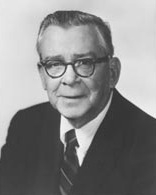George W. Andrews
George William Andrews | |
|---|---|
 | |
| Member of the U.S. House of Representatives from Alabama's 3rd district | |
| In office March 14, 1944 – January 3, 1963 | |
| Preceded by | Henry B. Steagall |
| Succeeded by | District inactive |
| In office January 3, 1965 – December 25, 1971 | |
| Preceded by | District inactive |
| Succeeded by | Elizabeth B. Andrews |
| Member of the U.S. House of Representatives from Alabama's At-large district | |
| In office January 3, 1963 – January 3, 1965 | |
| Preceded by | George M. Grant |
| Succeeded by | Kenneth A. Roberts |
| Personal details | |
| Born | December 12, 1906 Clayton, Alabama |
| Died | December 25, 1971 (aged 65) Birmingham, Alabama |
| Political party | Democratic Party |
| Spouse | Leslie Elizabeth Bullock Andrews |
| Alma mater | University of Alabama at Tuscaloosa |
| Occupation | lawyer
politician judge |
George William Andrews (December 12, 1906 – December 25, 1971) was an American politician and a U.S. Representative from Alabama, and the husband of Elizabeth Bullock Andrews.
Congressman Andrews is well known for objecting to the Supreme Court decision banning school prayer by saying, "They put Negroes in the schools and now they've driven God out."
Biography
Andrews was born in Clayton, Alabama son of George William and Addie Bell (King) Andrews. He attended the public schools, and graduated from the University of Alabama at Tuscaloosa in 1928. He was admitted to the bar in 1928 and commenced practice in Union Springs, Alabama. On November 25, 1936, he married Leslie Elizabeth Bullock.
Career
District attorney for the third judicial circuit of Alabama, he served from 1931 to 1943. During the Second World War, he served as a lieutenant (jg.) in the United States Naval Reserve from January 1943 until his election to Congress, at which time he was serving at Pearl Harbor, Hawaii.[1]
Andrews was elected as a Democrat to the Seventy-eighth Congress to fill the vacancy caused by the death of Henry B. Steagall. He was reelected to the fourteen succeeding Congresses and served from March 14, 1944, until his death from complications following heart surgey in Birmingham, Alabama on December 25, 1971. In 1957, he voted against H.R. 6127, Civil Rights Act of 1957.[2]
Death and legacy
Andrews died in Birmingham, Alabama on December 25, 1971 (age 65 years, 13 days). He is interred at Oak Hill Cemetery, Union Springs, Alabama.[3] The George W. Andrews Lake and George W. Andrews Federal Building are named for him.
References
- ^ "George W. Andrews". Biographical Directory of the United States Congress. Retrieved 19 May 2013.
- ^ http://www.govtrack.us/congress/votes/85-1957/h42
- ^ "George W. Andrews". The Political Graveyard. Retrieved 19 May 2013.
External links
- United States Congress. "George W. Andrews (id: A000206)". Biographical Directory of the United States Congress.
- George W. Andrews at Find-A-Grave
![]() This article incorporates public domain material from the Biographical Directory of the United States Congress
This article incorporates public domain material from the Biographical Directory of the United States Congress
- 1906 births
- 1971 deaths
- People from Clayton, Alabama
- Members of the United States House of Representatives from Alabama
- United States Navy officers
- American military personnel of World War II
- Democratic Party members of the United States House of Representatives
- Alabama Democrats
- 20th-century American politicians
